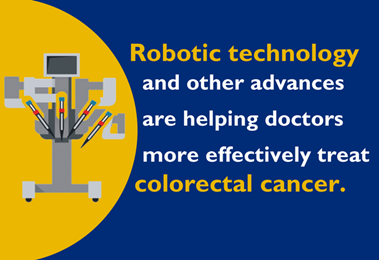Treating Colon Cancer That Has Spread to the Liver: A Team Approach
Reviewed By:
Reviewed By:
If you or a loved one has a colon cancer diagnosis, there is also the chance that the cancer will spread (metastasize) to other organs, most commonly the liver. However, according to Dr. Richard Burkhart, a Johns Hopkins cancer surgeon and researcher, advancements in the treatment of liver tumors caused by colon cancer have improved survival rates drastically. In fact, 40-60 percent of patients treated for isolated colon cancer liver metastasis are still alive five years after treatment.
At Johns Hopkins, researchers such as Dr. Burkhart are conducting clinical trials to find ways to slow or prevent the spread of colon cancer. These trials, coupled with a multidisciplinary, or team, approach using molecular testing, surgical techniques, chemotherapy and radiation, have greatly improved life expectancy for patients in the last 10 years.

How a Multidisciplinary Team Treats Colon and Liver Cancer
A multidisciplinary approach to colon and liver cancer treatment means that you’ll get an optimized plan based on your individual medical history, tumor type and genes. Several types of cancer specialists work together on your team so you can benefit from their combined expertise.
“The center where you have your treatment should have access to multiple types of doctors who communicate regularly,” says Dr. Adrian Murphy, instructor of oncology at the Johns Hopkins University School of Medicine. “This is extremely important because one type of specialist alone is not able to manage your care. This truly requires collaboration.”
There are generally six types of specialists on a multidisciplinary cancer team:
Medical Oncologist
A medical oncologist specializes in treating cancer with chemotherapy and other targeted therapies. Previously, pathology reports were the only indication of a cancer diagnosis in the colon. Now, medical oncologists can go further into the molecular content of a tumor. This molecular testing helps with treatment decisions.
There are two types of molecular testing. Depending on the tumor, an oncologist might use these tests:
- Microsatellite stability testing
Microsatellite instability is when there is a defect in the ability to repair DNA mistakes in your cells. Knowing that a patient has microsatellite stability can help predict a positive response to immunotherapy.
- KRAS testing
KRAS is a gene that often mutates in the presence of colon cancer. Knowing that a patient has this mutation predicts a lack of response to certain drugs.
Once molecular testing is complete, your cancer specialists will discuss the best treatment for your cancer, which often includes chemotherapy.
Surgeon
The treatment of choice for cancer that has spread to the liver is surgery. The liver is the only organ in the body that can regenerate, so as long as 20 percent of the liver remains after surgery, it can regrow and retain functionality. If the tumor is so large that it requires more than 80 percent of your liver to be removed, doctors may consider using a procedure called preoperative embolization, which blocks the blood supply to a portion of the liver and tumor. This essentially starves the tumor and shunts blood to the healthy liver to stimulate liver growth and allow surgery to be safely performed.
When you have cancer of the liver and the colon, you may be able to have surgery to remove both cancers at once or do a staged approach. Your surgeon will discuss which option is best for you.
Radiation Oncologist
A radiation oncologist specializes in treating cancer with radiation. If your tumor is too large and surgery alone is not an option, surgery combined with other procedures, such as radiation therapy, may be recommended.
While chemotherapy is performed by a medical oncologist, radiation may be a treatment option as well. The procedure is very similar to a chest x-ray. A radiation oncologist uses a machine to deliver targeted high-energy particles or waves to destroy or damage cancer cells in the tumor.
Interventional Radiologist
Interventional radiologists perform image-guided diagnostic and therapeutic procedures for patients with cancer and other conditions. There are three options:
- Tumor ablation
An image-guided technique that uses heat to destroy a tumor in the liver without removing it.
- External radiation therapy
A procedure performed outside of the body that targets a tumor, sparing other parts of the liver.
- Catheter-directed therapies
A radiologist inserts a catheter and delivers chemotherapy agents or radiation into blood vessels of the tumor to starve it of blood and deliver a targeted treatment.
“The goal of your team of cancer specialists is to work together to consider all options and methods of treatment,” explains Murphy. “This way, they can utilize the most current tests and techniques available to treat your individual diagnosis.”
Pathologist
Pathologists specialize in interpreting tests from tissues, such as biopsies, in order to make a conclusive diagnosis. For example, when they examine tissues from a liver biopsy, pathologists can help make the diagnosis that cancer cells originated from the colon. This is an important diagnosis that helps ensure that you receive the correct type of treatment.
Pathologists also use their extensive knowledge of cancer biology to run complex molecular testing and help your oncologist interpret the results.
Radiologist
Radiologists specialize in diagnosing medical conditions through the use of imaging techniques, such as CT scan (computed tomography) or MRI (magnetic resonance imaging). They are particularly important when it comes to staging colon cancer and guiding the most appropriate imaging study to make a conclusive diagnosis.
Radiologists work with the team to determine the exact location of tumors in the liver in order to help treatment planning in individual cases.








